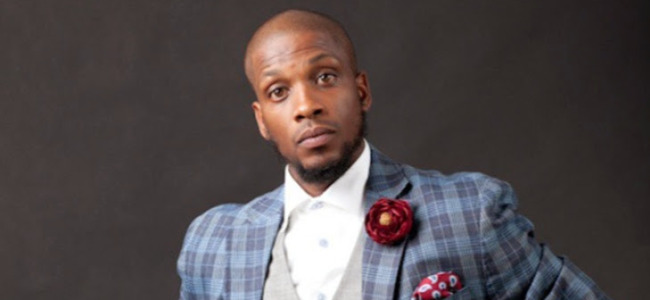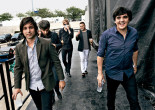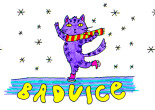
Stand Up & Deliver: Everything Starts In The Barbershop

Photo: Impact
Houston has a storied past when it comes to stand-up comedy. We all know about the greats who came and went, but there aren’t too many who have stayed and command when and how they leave. When I started this series off, the only comic I wanted from start to finish was Ali Siddiq. I don’t think there’s a comic in this town who doesn’t hold him in the highest regard. Siddiq commands an audience like no one I’ve ever seen, and he does most of it sitting down. Siddiq won Comedy Central’s 2024 Comic To Watch, and he’s had appearances on Showtime, NBC, HBO, and Comedy Central; but you wouldn’t know that when you talk to a guy who might be the most humble entertainer I’ve met. It’s a true honor to end this series this year with the one guy who could easily be the biggest comic to come out of Houston in the past twenty years. FPH was lucky enough to get an hour with him, and it was one of the best interviews we got all year.
FPH: You’re from Houston Correct?
AS: Yeah, I’m from Third Ward.
FPH: You’ve been at this for a good while, but your backstory is littered with all kinds of hearsay and rumor…you wanna’ set the record straight on that backstory?
AS: It was in my Showtime piece, I feel like everyone knows it. But I started doing stand-up in prison. I went in for drug trafficking when I was 19, and I got out on October 21, 1997. I was on parole until October 21, 2024.
FPH: You’ve gotten to tour with some heavy hitters and yet you’ve stayed humble and kept a constant working & touring schedule. Is humility key to success in the world of stand up?
AS: I don’t know if it’s a key, but there’s not a lot of it. Everything you do as a comic is a stepping stone to where you wanna’ go. There’s no reason to celebrate early on and be rude to people. That’s like celebrating in the first quarter of the game and you don’t know what the outcome will be in the end. When I go to a comedy club, the most important people to me are the waiters and the staff. There’s a short time between who’s a waiter there and who’s a general manager. We all started the same way, Chappelle, Eddie, whoever; we all got our start in the same place. I just try to focus on the craft and be nice to everybody. I think i’m one of the few comics in this town, who, I don’t want to say is successful; but one of the one’s who has had success, who still goes out to watch new comics. I watch them because I want to try and help them. When I got started, there wasn’t anyone there to help me. How to do a three minute audition, how to change the way a joke is told, how to get an agent; I want to help them as much as I can. And, because I have the contacts now, I can just call the comic they want to work with, or the person at CBS, or whatever. I wanna’ help them get to where they want to go, now matter what it is or with who it is.
FPH: You can command an audience better than anyone I’ve seen in my life. Is that something that comes natural or is that something that takes time to cultivate?
AS: It’s something that you develop over time. The way I structure myself is to set ridiculous challenges to myself. I meet and hang out with people far greater than I, and I just listen to what advice they give me. An example is where I stand on stage. Some comics stand to the left, some to the right, and some walk around. I took a lot of time to structure that and decided I wanted to be center stage and on top of the crowd. I chose that as the primary place to deliver my material. That’s where the sitting came from, like Paul Mooney. I look at the room as a grid, and think, “Who do I have to get first to command this room?”
FPH: You might be the only comic since Bill Cosby to take a seat when you’re on stage. The act of doing that takes away so much of the control you have over the audience, yet like Cosby; you never seem to lose them. Have you always done that, cause’ it’s incredibly ballsy?
AS: It just developed over time. The first time I saw Bill Cosby “Himself,” I thought, “you know how funny you have to be to sit?” It’s all about the idea of if you can do this, you can get this, and so on. I was out with D.L. (Hughley) and I said, “I wanna’ walk out with no music and no intro, and just sit down and start.” And he encouraged me to practice it, and I did forty five minutes like that, and I’ve been doing it ever since. Bill Burr hit me up and said he saw a clip of me on the internet, where I sat down and told a joke about needing noise to go to the bathroom. He said, after I saw that I thought, I gotta’ work with that guy. And he hit up Patrice for my info and he gave it to him, and that’s how we got to work together.
FPH: I read that you’re influenced by Richard Pryor and Eddie Murphy, is there anyone else from the past who you’re inspired by? Anyone presently?
AS: From the past there are way more than just those two guys. Rodney Dangerfield, Phyllis Diller, and Don Rickles. Presently, I really like D.L. Hughley, Frank Ajaye, Patrice O’Neill, Bill Burr, Dave Chapelle; and then comics like Ari Shaffir, JJ Williams, and Dominique. I’m a comic’s comic, so there are comics I like who haven’t hit yet; but they’re inspiring to me.
FPH: You have four albums, which is I think more than any other Houston comic. Which one of them is your favorite?
AS: “Talking Loud Saying Something” by far. I had seven albums, but the jokes weren’t there yet, they weren’t polished. Even though I had just wrote the set, the jokes on that album felt polished and ready. I record raw, and all of my albums have stuff in them that actually happened at the show. On “Enjoy Your Life,” you hear this lady bugging me, and I left it in. I was nice twice but then the third time I said one of the funniest things I think I’ve ever said. “Lady, you wanna’ talk so bad that you’re the type of person who goes to a silent movie and reads out loud.” And, the audience was with me, and they gave off that feeling like, “finally.” Now, I left that in to show that the audience and I were on the same page. And what better a way to describe someone enjoying their life when you do what I do and the audience is right there with you.
FPH: Eddie Murphy once said, “When I started off, every bit I did went from the mirror in my bedroom to the audience in the clubs.” Do you have a similar process when you’re working out new material?
AS: Well, for me, everything starts off in the barbershop. Every premise, every idea, every joke starts out there, and here’s why. There’s no social status in the barbershop, just like in the comedy club. Thugs, teachers, millionaires, plumbers; they’re all there in one place. The only way you can go before me and everyone else is to pay for all of us first. Every ethnicity and background is there, just like in the comedy club. My process is my brain, my mouth, the barbershop, and then the club. I judge how it works there before it goes anywhere else.
FPH: What about comedy drew you to it?
AS: I liked the art of telling a story and captivating people with it. To have the control, to make people laugh, and to play all of the characters while conveying all of the emotions…progressively.
FPH: What’s your definition of a successful comedy career?
AS: When I got released from prison, they ask you what you’re gonna’ do; and I said I was gonna’ be a stand-up comic. They said, “What? Get outta’ here!” I worked at a department store and at a sunglass shop, and I looked at what other comics were doing at that time. So I went and I got a suit and went up in a club, and got booed off the stage in two minutes. Then I sat back and I looked at the audience, and I came back two weeks later in jeans and a T-shirt and killed; cause’ I looked like them. I felt like from that point on, I was a success. I haven’t had a job since I started, I support my family with this. All of this that’s come after has just been icing on the cake. I judge success differently, I get up when I want, and I make more money for an hour’s worth of work than most people. I’m already a success, and now I’m just trying to see how far I can go in this success and where I can take it from this point on.
You can learn a lot about life, entertainment, and comedy from his words. There might not be another entertainer out there who’s as humble as Ali Siddiq. While he enjoys the icing stage of his career, you can catch Siddiq at Houston’s Improv December 26th through December 28th, when he records his upcoming album “Damaged Goods.” According to Siddiq, it’s about how through your past, or your family history, you can be damaged and still be good. However, anyone who sees him on stage, would say that he isn’t even remotely “damaged.”



